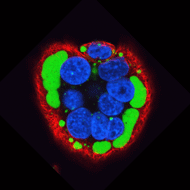
Project to reduce risk of accidental release from the lab
Scientists at the Pirbright Institute have destroyed the last archive samples of rinderpest virus, to reduce the risk of the virus re-emerging through accidental or deliberate release.
Rinderpest virus caused the most lethal cattle disease ever known, but after a huge global campaign it became the second disease to be eradicated, after smallpox in 2011.
However, at the time, more than 40 laboratories in 36 countries held samples of the virus, putting the world at risk of a reoccurrence. The World Organisation for Animal Health (OIE) and the Food and Agriculture Organisation of the UN (FAO), designated some labs - including Pirbright - as Rinderpest Holding Facilities.
A project called ’Sequence and Destroy’ was launched to destroy the samples (except a minimal number for reference), after recording genetic information through full-genome sequencing. Pirbright has destroyed more than 2,500 samples under the project.
Dr Michael Baron, honorary fellow at the institute, said: “The biggest risk of rinderpest re-appearing comes from an accidental escape from a laboratory, something that might be possible in the future if stocks are kept, even though no one is working on the virus. But at the same time we do not want to destroy what might be important biological information.
“By capturing that information and then destroying the oldest and largest archive of the actual virus, we hope to set an example to other laboratories and encourage them to get rid of their remaining lab samples.”
Dr Carrie Batten, chair for the Rinderpest Holding Facility Network, added: “This is a culmination of years of work by Pirbright scientists and our international collaborators; virus samples from as far back as the 1950’s have been destroyed. I feel privileged to have had a part to play in securing our future from rinderpest.”
Image © Pirbright Institute



 The Animal and Plant Health Agency (APHA) has updated its online reporting service for dead wild birds.
The Animal and Plant Health Agency (APHA) has updated its online reporting service for dead wild birds.